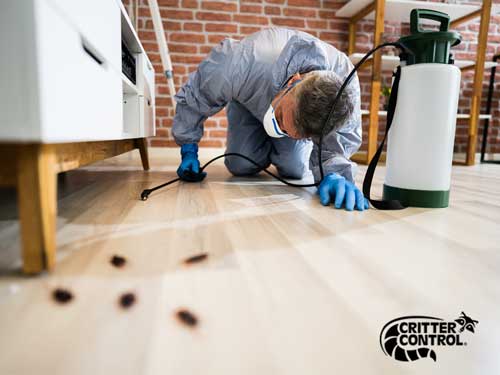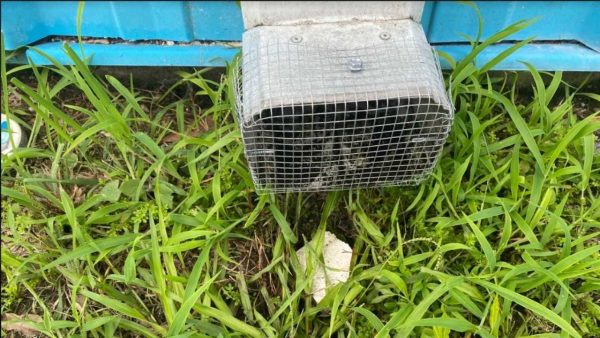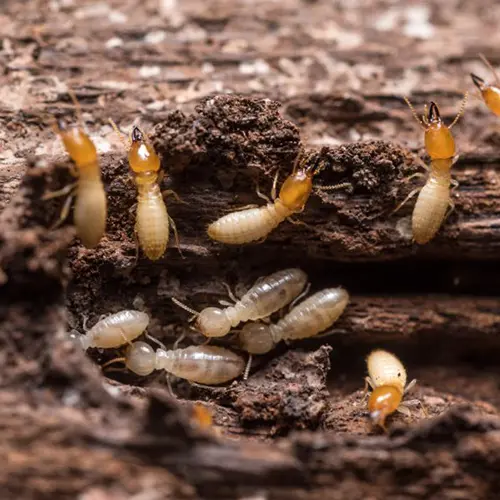Discover the Significance of Bug Control in Maintaining a Healthy Setting and Treatment Methods

The Duty of Pests in Ecosystems
Insects, often watched only as nuisances, play a diverse function in environments that is crucial for keeping ecological balance. They add considerably to various eco-friendly procedures, consisting of pollination, vitamins and mineral biking, and insect control. Lots of insect varieties, such as bees and butterflies, are crucial pollinators for a large variety of plants, which in turn supports biodiversity and food manufacturing.
Furthermore, bugs serve as prey for various predators, creating a crucial web link in food webs. This interdependence ensures the survival of different types and aids manage populaces within ecological communities (Termite treatment Port Charlotte). Decomposer insects, such as certain beetles and fungi, are critical in breaking down organic matter, thus improving soil and promoting vitamins and mineral recycling.
On the other hand, while insects can be advantageous, their overpopulation or intrusion into non-native environments may disrupt these eco-friendly features. This intricacy highlights the importance of comprehending insect dynamics, as effective parasite administration methods have to think about both their ecological roles and potential effect on human activities. Stabilizing pest presence while decreasing damage is essential for preserving the integrity of ecological communities and ensuring agricultural productivity.
Health Risks Associated With Pests
The visibility of pests in various atmospheres prolongs past their environmental functions, as they also present substantial wellness threats to human beings and animals. Many parasites, consisting of rats, parasites, and pests, are service providers of diseases that can have serious wellness implications. Rodents are understood to transmit hantavirus and leptospirosis, both of which can lead to extreme breathing and kidney problems, specifically.
Bugs such as ticks and insects are notorious for spreading vector-borne conditions like malaria, dengue high temperature, and Lyme condition. These diseases can lead to high morbidity and mortality rates, specifically in at risk populaces. In addition, bugs like cockroaches and vermins can intensify allergic reactions and asthma, adding to breathing troubles in individuals, especially those with pre-existing conditions.
In addition, the visibility of parasites can result in mental tension and pain, affecting general health. Contamination of food and surface areas by insect droppings and remains can cause foodborne illnesses, highlighting the relevance of keeping sanitary conditions. Therefore, recognizing the health and wellness threats linked with pests is important in acknowledging the necessity of reliable insect monitoring approaches to protect human and animal health.

Advantages of Reliable Pest Control
Efficient parasite control is important for preserving a healthy and balanced and safe setting, as it constantly reduces the various dangers connected with insect infestations. One of the main advantages of efficient insect monitoring is the reduction of wellness hazards.
Additionally, reliable insect control safeguards home and frameworks from damages. Many insects, like termites and carpenter ants, can trigger considerable structural damages that might need pricey repairs. By proactively taking care of these property owners, invasions and services can shield their financial investments.
Another considerable benefit is the enhancement of overall lifestyle. A pest-free atmosphere adds to mental wellness and lowers his explanation tension related to infestations. Efficient pest control fosters a much safer atmosphere for animals and youngsters, guaranteeing that homes remain shelters totally free from harmful chemicals and disease-causing microorganisms.
Common Pest Control Methods

In the world of parasite administration, different strategies are used to combat invasions successfully. These methods can be generally categorized into 3 primary methods: social, mechanical, and chemical controls.
Social control entails changing techniques to reduce pest reproduction, establishment, and survival. This may consist of plant turning, proper cleanliness, and habitat control, which collectively produce an atmosphere less for pest proliferation.
Mechanical control uses physical approaches to eliminate insects (Termite treatment Port Charlotte). Techniques such as obstacles, vacuum cleaners, and catches are frequently made use of to directly eliminate insects from a location. This technique is especially efficient for handling rodents and pests without using harmful chemicals
Chemical control involves the application of pesticides to take care of parasites. These materials can be categorized right into pesticides, fungicides, and herbicides, each targeting certain sorts of pests. It is critical to make use of these chemicals sensibly, adhering to security guidelines and policies to lessen potential harm to non-target species and the environment.
Each bug control technique has its restrictions and advantages, and often, an incorporated approach incorporating multiple methods produces the most effective lead to preserving a pest-free environment.
Lasting Pest Monitoring Practices
Lasting insect administration methods incorporate a variety of techniques made to lessen environmental influence while efficiently regulating pest populations. These techniques prioritize the usage of eco-friendly methods over chemical pesticides, thereby lowering the risk of damage to non-target species, including beneficial pests, wildlife, and people.
Integrated Pest Administration (IPM) is a cornerstone of lasting methods, incorporating biological, cultural, mechanical, and chemical strategies to handle parasites. For example, organic control involves introducing natural killers or parasites to suppress bug populations. Cultural techniques, such as plant rotation and polyculture, disrupt pest life process and boost ecosystem resilience.
Mechanical methods, such Click Here as catches or barriers, can successfully stop insect access without chemical intervention. Additionally, keeping healthy ecological communities via correct dirt administration, plant wellness, and biodiversity can normally mitigate pest problems.
Education and understanding are vital parts, empowering areas and individuals to identify bug hazards early and carry out safety nets. Termite treatment Port Charlotte. By promoting an alternative technique that stabilizes bug control with eco-friendly integrity, sustainable parasite administration techniques not only protect frameworks and crops but also add to a much healthier atmosphere for future generations
Verdict

Understanding the health and wellness risks connected with parasites is crucial in recognizing the need of reliable bug administration methods to guard human and animal health.
Reliable insect control is crucial for keeping a safe and healthy and balanced environment, as it continually reduces the many dangers linked with pest infestations.Integrated Parasite Management (IPM) is a cornerstone of sustainable techniques, incorporating organic, cultural, mechanical, and chemical strategies to take care of pests. By recognizing the function of bugs, acknowledging associated health and wellness dangers, and using varied treatment techniques, a sustainable technique to pest administration can be attained. Integrated Pest Administration (IPM) emphasizes find a holistic methodology that reduces harm to helpful organisms while efficiently managing pest populations.